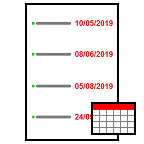26 - Il verbo modale "Can"
Can e
Could ("Poter fare", "Saper fare")
"Can" è
usato:
- Per
esprimere "capacità/abilità" (nel senso di essere capace
di fare qualcosa o sapere come fare
qualcosa)
Es: He can swim but he can't play football [Lui sa nuotare ma (lui) non sa giocare a
calcio]
- Per
esprimere un "permesso" (nel senso di dare o ricevere un
permesso)
Es: Can I use your computer? [Posso (io) usare il tuo
computer?]
Nota: Can è di
solito meno formale di May.
"Could" è
usato:
- Per
esprimere una "capacità/abilità nel
passato"
Es: She could sing when she was young [Lei sapeva cantare quando (lei) era
giovane]
- Per
esprimere un "permesso (più formale rispetto a
Can)"
Es: Could I come to your party? [Potrei (io) venire alla tua
festa?]
Forma Affermativa:
Soggetto + CAN (o COULD) +
Verbo senza il "to" (ad eccezione di "ought
[dovere]") + Complemento
Nota: Can e
Could sono uguali per tutte le persone (1°,
2° e 3°), sia per il singolare che per il
plurale.
Esempi:
I can sing
[Io so cantare]
You can play football [Tu sai giocare a calcio]
He
can use my computer [Lui può usare il
mio computer]
John can use my
computer [John può usare il mio
computer]
Forma
Interrogativa:
CAN (o COULD)
+ Soggetto + Verbo senza il
"to" + Complemento
Esempi:
Can you sing? [Sai (tu) cantare?]
Ris. 1: Yes, I can.
[Si.]
Ris. 2: Yes, I can sing. [Si, io so
cantare.]
Ris. 3: No, I cannot. [No.]
Ris. 4: No, I can't.
[No.]
Ris. 5: No, I can't
sing. [No, io non so
cantare.]
Can you play
football? [Sai (tu) giocare a
calcio?]
Ris. 1: Yes, I can.
[Si.]
Ris. 2: Yes, I can play football. [Si, io so
giocare a calcio.]
Ris. 3: No, I cannot. [No.]
Ris. 4: No, I can't.
[No.]
Ris. 5: No, I can't play
football. [No, io non so giocare a
calcio.]
Can he use your
computer? [Lui può usare
il tuo computer?]
Ris.
1: Yes, he
can. [Si.]
Ris.
2: Yes, he can
use my computer. [Si, lui può usare il mio
computer.]
Ris. 3: No, he cannot. [No.]
Ris.
4: No, he
can't. [No.]
Ris. 5: No, he can't use my computer. [No, lui non può usare il mio
computer.]
Forma Negativa:
Soggetto + CAN (o COULD) + NOT + Verbo senza il "to" (ad eccezione di "ought [dovere]") +
Compl.
Esempi:
I cannot sing [Io non so cantare]
I can't sing
[Io non so
cantare]
You cannot play football
[Tu non sai giocare a
calcio]
You can't play
football [Tu
non sai giocare a calcio]
He cannot use my
computer [Lui non può usare
il mio computer]
He can't use my
computer [Lui non può usare il mio
computer]
Nota:
La forma
negativa di Can (non
ha "forma contratta") è Cannot
(Can't è la "forma
contratta").
La forma negativa di Could ('d è la "forma contratta") è Could not (Couldn't è la "forma
contratta").
Nota:
can = to be able to [essere capace a]
= allowed to [essere autorizzato a/avere il permesso di]
can't = not
be able to [non essere
capace a] = not allowed
to [non
essere autor. a/non avere il perm. di]
(SOLO Can è un
"verbo modale", quindi per gli altri verbi la formazione di frasi
interrogative e negative si effettua con il verbo ausiliare To Do)


 EN
EN
EN
EN